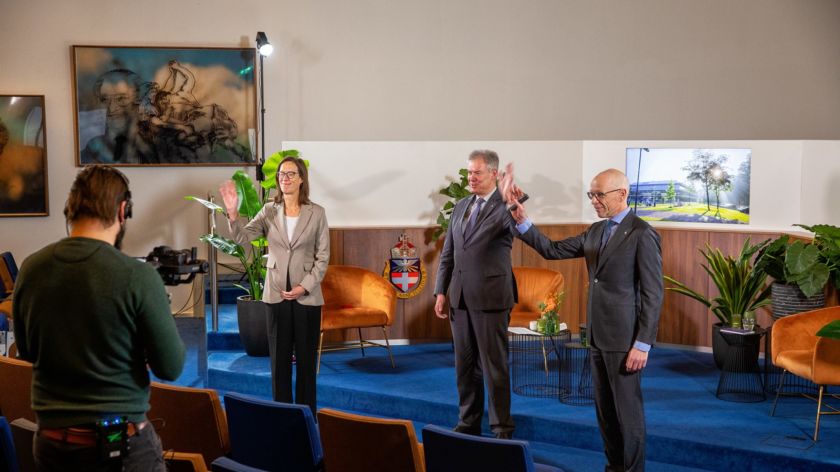New Years’ Resolutions: University wants to focus more on wellbeing and digital security
-
 The New Years’ Gathering marked the first time since April 2021 that the Executive Board was complete.
The New Years’ Gathering marked the first time since April 2021 that the Executive Board was complete.
Radboud University wants to hire additional staff in 2022 in order to boost the wellbeing of its students and employees. This was stated by chairman Daniël Wigboldus in his New Year’s speech this morning. ‘We will dip into our reserves to hire a lot more people.’
‘Sadly this gathering is online once again.’ Daniël Wigboldus started his New Year’s speech of 2022 on that note, which took place in an empty auditorium. ‘Like you, I’ve grown sick of my own attic room’, Wigboldus said. ‘We humans are social creatures, and I miss the campus.’ The only others present were rector Han van Krieken and new board member Agnes Muskens.
The corona pandemic still has Radboud University firmly in its grasp, as became apparent during the New year’s speech. This was due to the corona regulations as well as the discussions that followed from it, such as those regarding vaccinations and proctoring.
The university does not have a ready-made solution to these issues. ‘We will have to keep listening to each other’, according to the chair. ‘Listening alone won’t naturally lead to understanding; it can even lead to more misunderstanding. But it is the very essence of coexisting, studying and working.’
New Years’ Resolutions
Next to wellbeing, digital security is one of the University’s spearheads in 2022, as can be read in the annual plan. The university will be reserving 2 million euros for it this year. Among other things there is going to be a Cyber Risk Council that will monitor risks concerning information security.
The university has also set itself objectives for research, education, and corona. They want to realise the structural financing for the lasers-and-magnets laboratory HFML-FELIX and stimulate interdisciplinary research on campus. There will also be a university-wide code of conduct, and there needs to be a new, concrete way of acknowledging and appreciating scientists.
Additionally, more money will be invested into small-scale personalised education and lecturer professionalisation. This year the university presents an adapted vision on education, which incorporates lessons and experiences from the corona crisis. Finally, the support for employees who work both from home and on-campus needs to be improved. A pilot program for these improvements is currently running in the Berchmanianum building.
Wellbeing and work pressure
Chair Wigboldus elaborated on student- and employee wellbeing in his look back on the past year. National and local surveys showed that the flexibility and extra effort that were required took a toll on wellbeing. Despite this, over the past year – as well as the year before that – there was no significant increase in the number of employees that reported sick for work, nor did overall study progress diminish.
However, according to Wigboldus, right now many people feel worse mentally speaking than they did before the pandemic. ‘I am thinking in particular of those students who started their studies and those colleagues who came to work with us in the midst of the corona regulations, without getting the chance to experience Radboud University and the campus in better times.’
The chair made an appeal to students and employees: ‘Keep an eye out for each other, care for each other, and, if you have the mental energy to spare, spend it on that fellow student or employee who needs it. A sympathetic ear can make a lot of difference.’
‘We will allocate significant funds to improve wellbeing in 2022’
But the university also wants to hire additional staff in order to improve wellbeing and lower the overall workload. ‘As Radboud University we will allocate significant funds to work on this in 2022. We will dip into our reserves to hire a lot more people. Not just in the faculties, but also in Radboud Services (supporting services, ed.).’
Daniël Wigboldus also called attention to digital security. ‘People are working incredibly hard on this issue behind the scenes’, according to the chair. The NWO, the Radboudumc and the HAN were all victims of hackers and data leaks in 2021. The University intercepted roughly 150,000 phishing mails last year. The chair called on students and employees to be especially vigilant, and to immediately report any unusual activities to the helpdesk.
Hermesdorf-prize
Rector Han van Krieken awarded several people with the Hermesdorf-prize during the New Year’s Gathering. This happened via video feed, corona-style. These prizes are awarded to scientists who were very prominent in the media in 2021. Marlies van Eck, professor in tax law, received the Hermesdorf Talent-prize for her research into the legal aspects of technology. She argued for a so-called ‘Kafka button’: employees at administrative organisations such as the UWV or the tax authorities use this if they notice that citizens are being moved from pillar to post. The rector awarded the regular Hermesdorf-prize digitally to eight researchers of the Centre for Migration Law (see below) for their publication Ongezien onrecht in het vreemdelingenrecht (Eng: ‘Invisible Injustice in Immigration Law’). In this work they described the unjust legal issues that asylum seekers and other migrants sometimes have to face in the Netherlands.
 Karen Geertsema, Kees Groenendijk, Carolus Grütters, Paul Minderhoud, Ellen Nissen, Tineke Strik, Ashley Terlouw and Karin Zwaan (Centre for Migration Law) receive the Hermesdorf Prize 2021. Photo: screenshot livestream
Karen Geertsema, Kees Groenendijk, Carolus Grütters, Paul Minderhoud, Ellen Nissen, Tineke Strik, Ashley Terlouw and Karin Zwaan (Centre for Migration Law) receive the Hermesdorf Prize 2021. Photo: screenshot livestream


